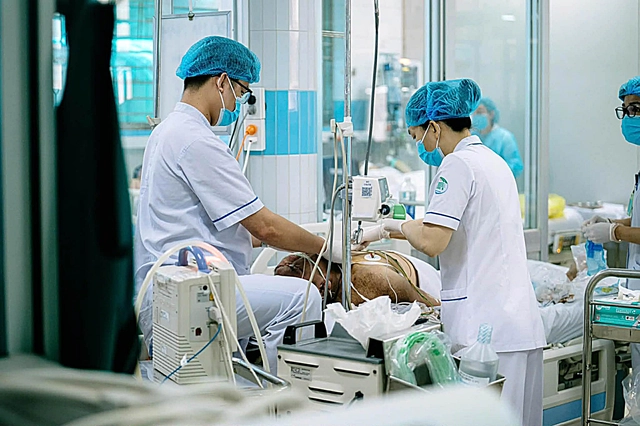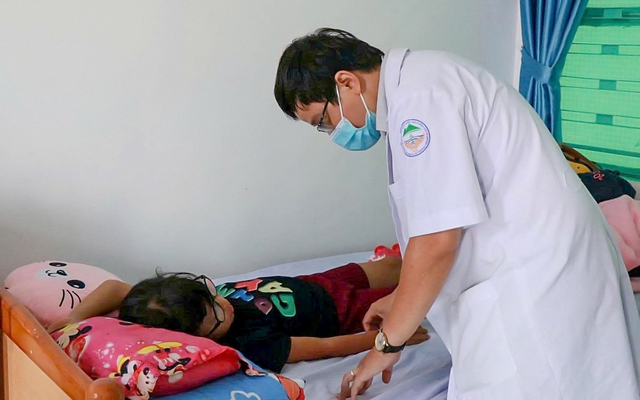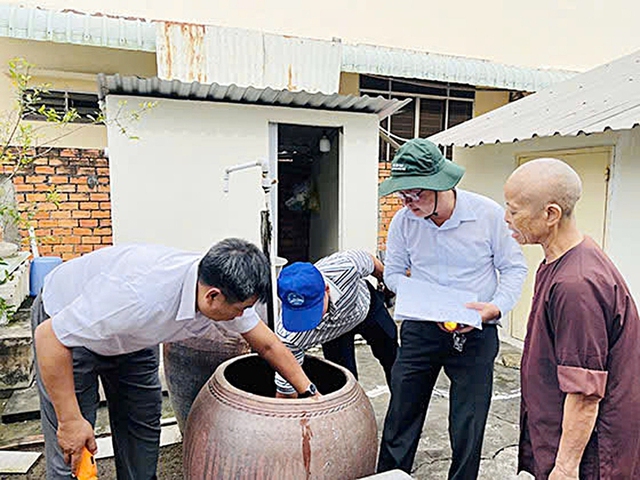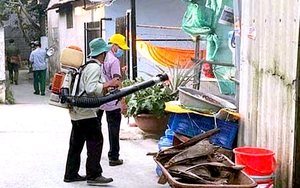
Doctors at the Ho Chi Minh City Hospital for Tropical Diseases care for a severe dengue patient. Photo: Thanh Hiep / Tuoi Tre
Vietnam has logged 135,515 dengue cases and 26 deaths from January through October, up 28.1 percent in infections and five more fatalities compared to the same period last year.
The southern region remains the epicenter with 103,601 cases, representing over 76 percent of nationwide infections. Ho Chi Minh City alone has reported more than 48,050 cases and 16 deaths.
Hotspots in major cities
Ho Chi Minh City recorded 1,961 new cases last week, bringing its year-to-date total to over 52,500. Localities with the highest incidence per 100,000 residents include Bac Tan Uyen, Bau Bang, and Can Gio.
Hanoi continues to detect cases across 125 wards and communes, prompting intensified surveillance and public messaging campaigns.
V.D.L., a 34-year-old patient from Hanoi’s Tay Phuong, developed severe symptoms after self-treating at home and was admitted to the National Hospital for Tropical Diseases with pleural effusion, abdominal fluid, and a high-risk prognosis due to obesity.
Both the Hospital for Tropical Diseases in Ho Chi Minh City and its counterpart in Hanoi have reported a growing number of severe cases, including patients presenting in shock or with internal bleeding.
In Da Nang, the central city’s Center for Disease Control has recorded more than 2,700 cases and over 110 small outbreaks in the year to date.
Thang Binh Commune, Dien Ban Commune, and Hoi An Ward are among the hardest-hit areas, with 162, 126, and 90 new cases reported over the past month, respectively.
Children and adults are both at risk

A doctor treats a child patient with dengue in Vietnam. Photo: TTO
At the City Children’s Hospital in Ho Chi Minh City, deputy director Nguyen Minh Tien warned that although pediatric admissions have slightly eased, cases remain steady and unpredictable weather continues to fuel outbreaks.
Across the southern region, hospitals are overloaded.
In Can Tho City, health authorities have recorded over 4,230 cases so far this year.
Admission numbers at Can Tho Children’s Hospital show 1,700 outpatient cases and 1,450 inpatients, including children arriving late in the shock phase with liver damage.
Vinh Long Province has reported over 5,200 cases, up 105 percent, while Dong Thap Province has seen more than 4,100 cases, up 135 percent from last year.
Experts warn of rapid mosquito population growth
According to Vo Hai Son, deputy director of the Department of Preventive Medicine under the Ministry of Health, mosquito populations explode immediately after storms and floods.
“Each Aedes mosquito can lay up to 200 eggs at a time. Under ideal conditions, it takes only 7-10 days to become an adult, and eggs can survive up to 6–12 months,” Son said.
With four circulating dengue virus serotypes, individuals can contract dengue up to four times, and 5-10 percent may develop severe complications affecting the liver, kidneys, heart, or causing internal bleeding.

Health workers check mosquito larvae at a home in Binh Thuy Ward, Can Tho City, southern Vietnam. Photo: Can Tho Center for Disease Control
Hospitals stress dangerous self-medication trends
Doctors also warned against inappropriate home treatment for dengue fever.
Ngo Trong Hieu, doctor from Gia Lam Hospital in Hanoi, stressed that patients must not use Ibuprofen, Aspirin, or other nonsteroidal anti-inflammatory drugs because these can trigger severe bleeding.
He urged immediate medical evaluation if high fever persists, or if patients experience fatigue, vomiting, abdominal pain, or belong to high-risk groups such as children, pregnant women, the elderly, or people with underlying health conditions.
Communities urged to act immediately
Health experts recommended several simple, effective measures to halt mosquito breeding.
Residents should empty or remove water-holding containers; change flower-vase water regularly; add fish to household water tanks; clear vegetation and debris; use mosquito repellents, screens, and nets; and cooperate with health authorities during chemical spraying.



Max: 1500 characters
There are no comments yet. Be the first to comment.